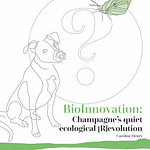Yesterday I was lucky enough to exchange with Cédric Moussé who shared the many ecological projects he is engaged in.
He began by explaining why he opted to build his winery according to the climatic well system, thus using geothermal characteristics to warm and cool down the building, and why he opted for solar energy to power his winery and vineyard activities.
We then touched upon the very interesting project of mechanically weeding the steep Cuisle vineyards with Vitibot Robots. The tractors are shared by many winegrowers all member of the CUMA (Coopérative d'Utilisation des Matériels Agricoles), who can vary widely in size. This model provides a cheaper alternative to chemical herbicides, and creates - according to Cédric - better grapes, which are better valued by the houses. It could therefore be a win-win solution for the complicated and divisive ‘zero-herbicides-in. champagne ‘ issue.
Then came my favorite part of the conversation - Cédric’s elaboration of reintroducing animals back into the vineyard, and the advantages of biodynamic treatments to stimulate soil and vine life. Soil regeneration remains under-developed in Champagne, even if several large houses seem convinced that a living soil is the key to long-term grape growing sustainability.
This video, in my opinion, is a clear witness of the desire of a small group of producers to work WITH nature to produce the best possible wine in terms of ecology and quality. Cédric mentioned the Japanese philosophy of Kaizen - an approach of continuous improvement created by small actions of positive change made by all employees of a company - as his leitmotiv to achieve carbon neutrality by 2030. He already halved his company’s carbon footprint between 2003 and 2022, and with his new extremely light bottle project - with the bottle weighing only 722 g - which is significantly lighter than the current eco-champagne bottle of 835 g - his use of paper neck foils, and the many changes made in every area of his grape and wine production, it is very likely he will achieve this goal.
The Champagne appellation was a pioneer in embracing carbon reduction goals long before it became fashionable, but in recent years it has been harder to make significant carbon reduction gains. Therefore ambassadors like Cédric are today even more essential than ever.
I am very grateful to Cédric for the time he set aside to bring us all a message of hope on earth day!













Share this post